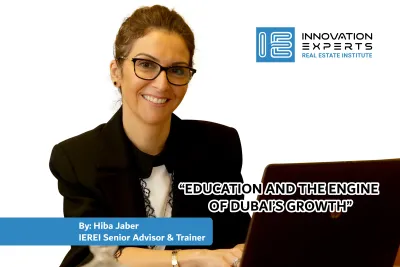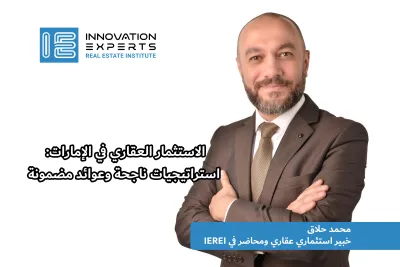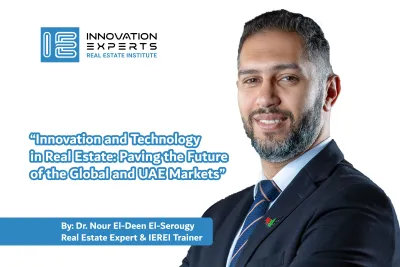Innovation and Technology in Real Estate: Paving the Future of the Global and UAE Markets
Innovation and technology have become indispensable in modern industries, with real estate emerging as one of the key sectors being transformed by cutting-edge advancements. The incorporation of artificial intelligence (AI), blockchain, virtual reality (VR), and PropTech (Property Technology) is fundamentally changing how properties are bought, sold, managed, and developed. Today, these technological advancements are providing real estate professionals with tools that enable faster transactions, data-driven decision-making, enhanced customer service, and more efficient operations.
In particular, the UAE is positioning itself as a global leader in real estate innovation, driven by government initiatives and a forward-thinking approach to technology adoption. This article delves into the importance of innovation and technology in real estate, both globally and in the UAE, and highlights insights from the “AI and the Art of Real Estate: Global and UAE Perspectives” course, which equips professionals to embrace these emerging technologies.
The Global Impact of Innovation on Real Estate
Across the globe, the real estate industry has traditionally been slow to embrace technological innovation. For decades, property transactions remained paper-heavy and reliant on in-person interactions, with little digital transformation. However, over the last 10 years, this narrative has shifted significantly as technology continues to disrupt the real estate sector.
The global PropTech market is forecasted to reach USD 86.5 billion by 2032, reflecting the rapid adoption of digital tools that enhance every stage of the property lifecycle—from search and discovery to transaction and management. According to a 2023 PwC report, 93% of real estate leaders believe digital transformation is critical to their business model moving forward.
One of the most revolutionary aspects of technology in real estate is the integration of AI. AI-powered tools are now at the heart of property searches, price valuations, predictive analytics, and customer service solutions. Machine learning algorithms can analyze vast datasets, such as property prices, neighborhood trends, and market conditions, allowing agents to make more accurate valuations and provide better recommendations to clients. According to McKinsey, AI can reduce transaction processing times by up to 30%, streamlining operations for real estate companies while providing superior services to buyers and sellers alike.
Another key innovation transforming the industry is blockchain. Blockchain technology ensures transparent and secure real estate transactions by creating immutable records that reduce the risks of fraud and errors. Tokenization of real estate assets through blockchain allows fractional ownership of properties, unlocking investment opportunities for smaller investors who traditionally would not have had access to high-value properties. A 2024 report by Deloitte predicts that tokenized assets in real estate could reach USD 1.4 trillion by 2030, reshaping investment strategies and democratizing real estate markets globally.
Moreover, virtual reality (VR) and augmented reality (AR) have become indispensable tools for property marketing. VR enables prospective buyers to take immersive virtual tours of properties from anywhere in the world, while AR can superimpose digital elements into real-world environments to enhance the buying experience. This trend has gained significant traction, especially during the COVID-19 pandemic when in-person property viewings were restricted. According to a report from Statista, the use of VR in real estate marketing increased by 35% in 2021, and the technology continues to grow in popularity.
UAE: A Global Leader in Real Estate Technology
One of the UAE’s standout achievements is the successful integration of blockchain into the property transaction process. The Dubai Land Department (DLD) has been using blockchain technology since 2017 to digitize real estate records and streamline property registration. This has reduced transaction times by up to 50%, according to DLD reports. Additionally, blockchain enhances transparency, a key priority for the UAE’s real estate market, as it seeks to attract international investors. A 2024 study by PwC revealed that 60% of UAE real estate companies plan to implement blockchain technology by 2026 to improve trust and reduce transaction friction.
The UAE is also embracing AI across the entire real estate value chain. Property Finder, one of the UAE's largest property platforms, uses AI algorithms to analyze market trends and provide personalized recommendations to users. According to Property Finder’s 2023 report, AI-driven features have improved customer engagement by 25%, significantly enhancing the user experience. These technologies are becoming integral to how agents and developers interact with clients, particularly in the competitive UAE market, where buyers from across the world seek properties with precision and efficiency.
Smart property management is another area where innovation is driving change. In smart cities like Masdar City in Abu Dhabi, buildings are equipped with IoT sensors that monitor energy consumption, optimize utilities, and improve the quality of life for residents. According to a report by Frost & Sullivan, smart building technologies in the UAE could save up to 30% in energy costs while also making properties more attractive to environmentally-conscious buyers and investors.
AI and the Art of Real Estate: Global and UAE Perspectives
In recognition of the growing importance of technology, real estate professionals are turning to specialized courses to build expertise in this area. The “AI and the Art of Real Estate: Global and UAE Perspectives” course is designed to equip real estate professionals with the tools and knowledge to harness AI and other advanced technologies. This course emphasizes the role of AI in transforming property valuation, marketing, customer service, and data analytics.
Participants learn how AI can provide a competitive edge by automating routine tasks, offering predictive insights, and creating personalized client experiences. The course also explores global trends and the unique challenges and opportunities within the UAE market, where AI adoption is already well underway. By understanding how these technologies can be applied locally and globally, real estate leaders are better positioned to navigate the fast-evolving landscape.
Numbers that Matter: The Impact of Technology in UAE Real Estate
- 80%: The percentage of property transactions in Dubai initiated and completed online, as reported by the Dubai Land Department in 2023. This reflects the country’s growing reliance on digital tools to streamline property sales.
- 30%: The reduction in time needed for property transactions in the UAE thanks to blockchain integration, according to the Dubai Land Department.
- $86.5 billion: The projected value of the global PropTech market by 2032, driven by AI, blockchain, and other real estate innovations (Precedence Research, 2024).
- 25%: The increase in customer engagement on Property Finder’s platform, attributed to AI-driven personalization features (Property Finder, 2023).
- $1.4 trillion: The potential market value of tokenized real estate assets by 2030, as predicted by Deloitte’s 2024 report.
The Future of Real Estate: Technology as a Necessity
As the global real estate market evolves, innovation and technology are no longer optional but essential components of a successful business strategy. AI, blockchain, and VR are reshaping every aspect of the industry, enabling real estate professionals to operate more efficiently, make better decisions, and offer enhanced experiences to clients.
In the UAE, where the real estate market is fiercely competitive and international buyers are drawn to its dynamic cities, embracing these technologies is critical for long-term success. The “AI and the Art of Real Estate: Global and UAE Perspectives” course stands out as a key initiative in preparing the next generation of real estate leaders to navigate this exciting and transformative future.
The time has come for real estate professionals to not just adopt technology but to master it, leveraging its full potential to drive growth, efficiency, and client satisfaction in an ever-evolving global market. As the UAE continues to lead the way, the real estate industry as a whole is on the brink of a technological renaissance.






